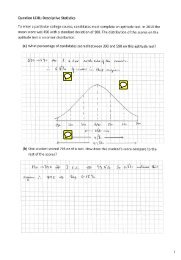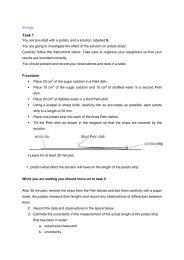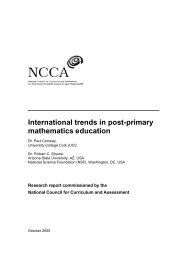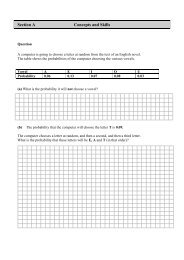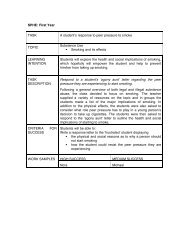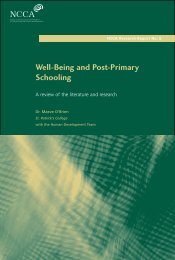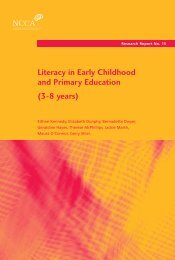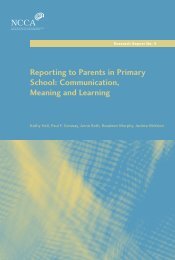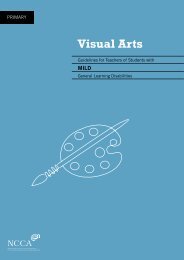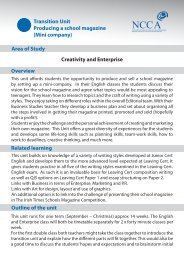Up and Away - National Council for Curriculum and Assessment
Up and Away - National Council for Curriculum and Assessment
Up and Away - National Council for Curriculum and Assessment
Create successful ePaper yourself
Turn your PDF publications into a flip-book with our unique Google optimized e-Paper software.
18<br />
Learning English as a second language<br />
Acquiring a FIRST LANGUAGE (mother tongue)<br />
1. Children first produce single words.<br />
2. Then they learn to combine words into phrases.<br />
3. In due course they learn to combine phrases into sentences.<br />
This process is driven by the urge to communicate, which is part of each child’s biological inheritance.<br />
Developmental orders in acquiring a FIRST LANGUAGE<br />
The acquisition of a first language is marked by regular developmental orders. These are familiar to<br />
parents <strong>and</strong> teachers. In the case of English, <strong>for</strong> example, the following stages may be observed as pupils<br />
learn to <strong>for</strong>m wh-questions correctly:<br />
What Mama singing?<br />
wh-WORD + NOUN (PHRASE) + MAIN VERB<br />
What Mama is singing?<br />
wh-WORD + NOUN (PHRASE) + AUXILIARY + MAIN VERB<br />
What is Mama singing?<br />
wh-WORD + AUXILIARY + NOUN (PHRASE) + MAIN VERB<br />
Success <strong>and</strong> failure in FIRST LANGUAGE acquisition<br />
All normally endowed children learn to speak the language of their environment.<br />
Depending on the environment in which they live, children will differ in their early experience, <strong>and</strong><br />
this will be reflected, in particular, in the words they know.<br />
There are no failures in first language acquisition as the acquisition of speech. All normally endowed<br />
children become native speakers of their first language.<br />
Learning to read <strong>and</strong> write is a conscious <strong>and</strong> intentional process. For most children it is part of<br />
schooling, <strong>and</strong> is subject to all the factors that determine success or failure in education generally.<br />
What about a SECOND LANGUAGE?<br />
There are many differences between second <strong>and</strong> first language acquisition, including the following:<br />
Unless it begins in early childhood, second language acquisition is not part of the learner’s primary<br />
cognitive development.<br />
The later second language acquisition begins, the more it is influenced by motivational factors.<br />
The developmental orders that we see in a<br />
child’s acquisition of the mother tongue also<br />
occur in second language acquisition.<br />
The errors to which they give rise should be<br />
h<strong>and</strong>led carefully. It is important not to<br />
interfere constantly with a child’s ef<strong>for</strong>ts to<br />
communicate.<br />
All normally endowed children learn their<br />
mother tongue successfully.<br />
Motivation can affect second language<br />
learning. This is not generally an issue with very<br />
young children but could be a problem <strong>for</strong><br />
children in the senior primary school.



